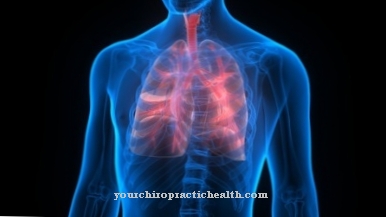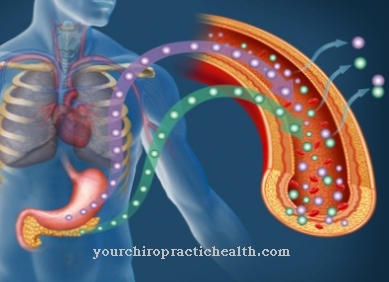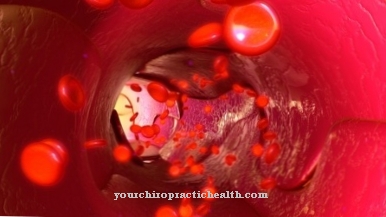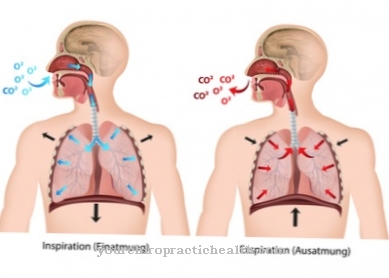What is thirstHow does thirst arise and what is the significance of thirst for humans? Even in Greek mythology, thirst is considered one of the most severe torments. For example, the angry Zeus sentenced his son Tantalus to thirst and hunger because he had betrayed divine secrets. Tantalus stood up to his knee in clear water, but if he wanted to drink it escaped. Lots of juicy fruits hung over him, but they flew away with the wind as soon as he tried to pick them. Thirst, eternal thirst, tantalum torments have been the name of the game for centuries.
What is thirst

If we ask a physiologist what thirst really is, he will answer something like this: Thirst is a feeling that is triggered when the salt concentration of the body fluids increases - be it as a result of a lack of water, for example after profuse sweating and diarrhea or after being too strong salted meals.
The term body fluid not only includes blood, it also includes the tissue fluid that is located between and in the cells. In addition to the nutrients that are important for cell metabolism, various minerals such as sodium, potassium, magnesium, calcium, chlorine, etc. are dissolved in it, all of which are in a precise relationship to one another and are involved in the smooth running of almost all functions of the body. This salt level is not a coincidence, but must always be kept at the same level through the cooperation of several organs.
First and foremost are the kidneys. The changing amount and concentration of urine, which are adapted to the water and mineral content of the body, depends on their activity. The functioning of the skin, lungs and intestines also influence the body's fluid and mineral content. With every change, no matter how small, regulations set in immediately to prevent fluctuations in the salt concentration. Therefore, any loss of fluid must be replaced. So thirst is a feeling that we feel when something is wrong in our water-mineral balance. You could compare it to the red control lamp on a machine. We can only judge how great our thirst is. Objectively, with the help of complicated apparatus, we only register the salt content of the blood.
How the feeling of thirst works
When we speak of thirst, which brings us to consciousness of profound changes in the water and mineral balance or of the organs, through whose function the salt concentration of the blood is kept constant, we must also ask ourselves where the center for the regulation is located Registers deviations from normal and transmits impulses to the organs. In addition to other vital centers that are responsible, for example, for the functioning of the heat balance and sleep, the so-called water center is also located in the intermediate brain.
It sends its impulses either via the pathways of the vegetative part of the nervous system, i.e. part of the nervous system that is independent of our will, or it gives stimuli to the pituitary gland, whose posterior lobe secretes the hormone adiuretin when the body's water supply threatens to drop below normal. The adiuretiri slows down the excretion of water by the kidneys and in this way helps to keep the body's fluid level constant. In addition, the water and mineral balance is regulated by the activity of the hormones in the adrenal cortex. Thirst is incorporated into this system in that it makes us aware of the change in the body's juices and calls on us to take active remedial action.
In general, however, habits and ideas regulate our fluid intake by way of conditioned reflexes, without being thirsty every time. As a result, the amount consumed does not always correspond to the organism's real need for fluid. Most of the time, even when feeling thirsty, more fluid is absorbed than the organism needs. This is easy to understand when you know that thirst is only quenched when the water is absorbed by the intestine. All too often it happens that on hot summer days we feel great thirst after sweating profusely, but for whatever reason we have no way of immediately quenching it.
Complications from dehydration
Our relative well-being shows that this has not yet led to serious changes in the composition of the body fluids. This is due to the fact that the body has liquid reserves in its subcutaneous tissue, which can be mobilized very quickly in an emergency and bring about a balance. At the same time - as mentioned above - the kidneys adjust their activity to the new conditions, that is, they produce less, but more concentrated urea. In this case, however, the release of fluid through the skin cannot be throttled, as the constant evaporation of moisture on the skin draws heat away from the body and thus regulates the temperature of the organism.
The thirst is particularly agonizing when working at high temperatures, for example in the sun in summer, in kitchens and bakeries or in steel processing. Due to the increased perspiration one is inclined to drink indiscriminately and is surprised that the thirst is not quenched despite the copious intake of fluids. How can this be explained? With the sweat, not only water is excreted, but also table salt - i.e. sodium and chlorine - whose task, among other things, is to retain water in the body. Let's not feed these substances back into our body with the liquid; In other words, if we only use tap water, cola or coffee, the body becomes depleted of salt.
As a result, the absorbed water is immediately excreted. So man is thirsty because he drinks too much water. For this reason, we should consume mineral water or a slightly more salted meal on hot days or at the work sites mentioned above. It should be emphasized, however, that more salted food should not become a habit for health reasons.
So how long can a person live without hydration? It has been experimentally proven that death occurs if the body loses 15 percent of water. How quickly this point in time is reached depends, among other things, on the organism's water reserves, on the air temperature and humidity, and on whether heavy physical work is being done at the same time. What is certain is that we can only survive a state of thirst for a few days.
Although adults can survive 24 hours without drinking and feel reasonably well, infants can then experience life-threatening disorders. So, like any other food or food in general, we cannot do without water for several days. This is only understandable when you consider that our body consists of 60-70 percent water. In the newborn it is even 75 percent. If we assume a body weight of 70 kilograms, this is 48 kilograms of water alone. The muscles make up the largest share with 50 percent and the fat tissue with 15 percent of the total fluid inventory.
The great importance of water also results from the fact that the function of the body cells is linked to the aqueous solution of nutrients. The excretion of metabolic end products by the kidneys is also not possible without water and digestion without fluids is also unthinkable. About 8 liters of digestive juices are secreted into the intestine every day. These are usually largely absorbed again in the large intestine. However, diarrheal diseases can lead to large losses of fluid if reabsorption is disturbed due to inflammation of the intestinal mucosa.
While too little is imperative for fluid, the body can tolerate too much within certain limits because we have several excretory organs, such as the kidneys, the skin, the lungs and the intestines. Every day we excrete about 2.5 liters (1500 ml urine, 500 ml sweat, the rest is accounted for by the moisture content of the excrement and the exhaled air). In healthy adults, this amount can increase to 5 liters or more if the person concerned has drunk too much.













.jpg)

.jpg)
.jpg)











.jpg)